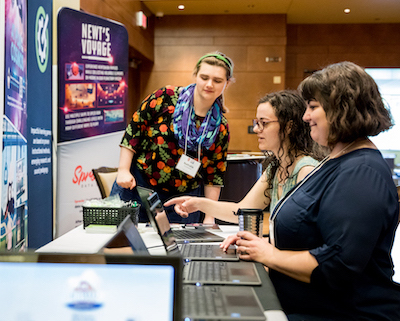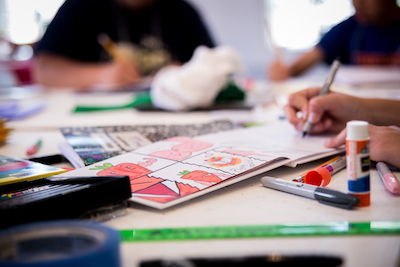What does a live events-based education outreach organization do in the midst of a global health pandemic? When the organization is embedded in one of the top-ranked schools of education in the country, innovation and adaptation are a given.
Innovation and adaptation are not new for the office of Professional Learning and Community Education (PLACE). You might say those elements were baked into its formation within UW–Madison’s School of Education.

“PLACE was formed in November 2018 to translate the best ideas and practices developed by School of Education faculty and staff into high-quality in-person and virtual professional learning opportunities across education, health, and the arts,” says Rich Halverson, associate dean for innovation, outreach, and partnerships and a professor in the Department of Educational Leadership and Policy Analysis.
After one short year of building its infrastructure to include program planning, operations, and marketing support, PLACE is now well-prepared to share the mission of the School and to bring relevant, research-based programs to an audience actively seeking professional and lifelong learning opportunities. With additional support from grants and gifts, PLACE produces programs that are accessible to a diverse group of learners and educators.
To meet the demands of a growing office, Halverson appointed Business Director Sarah Klein as the current executive director for PLACE in November of 2019. Though no one could have predicted just how much change the office and the university would undergo as a result of the pandemic, Klein has led the effort to continue delivering access to the best ideas and people in the School of Education to teachers, educators, and leaders around the world — the Wisconsin Idea in action.
When asked about the unique challenges of the current moment, Klein said, “The rapid spread of COVID-19 made us stop in our tracks and re-evaluate how we deliver our programs and engage with our participants. Like most organizations, we have rapidly pivoted our office and programs online.”
“While working remotely, we are finding new ways of engaging with and supporting one another in our work, in addition to providing our learning communities with needed outlets and resources,” she adds. “K-12 teaching and learning have been turned upside down, and PLACE is working to create professional development and coaching support that will help provide our school partners with the necessary tools to navigate these changes. This moment in time will redefine how learning is delivered beyond the pandemic.”

After a statewide safer at home order was issued in March, PLACE has evolved existing programs like the AP Summer Institute, the yearlong Math Equity Project, the Greater Madison Writing Project (GMWP) Yearlong Institute, and the multidisciplinary Play Make Learn conference to be delivered fully online. PLACE has also created new offerings like its monthly Feminist Fireside Chats, part of the Women’s Leadership Incubator, as well as a series of summer writing camps for youth that were uniquely designed for online delivery.
The UW Community Arts Collaboratory — which empowers youth as art makers by engaging them as agents of creativity, intellect, and self-efficacy — brought art into people’s homes this spring. Through virtual Facebook watch parties from Drum Power and Performing Ourselves, as well as videos from Whoopensocker showcasing stories from participating youth, the Arts Collab has been working hard to maintain connections with their audience. In addition, the Arts Collab created a new podcast
PLACE Conference and Event Services Director Matthew Freid is committed to providing the expertise needed to make these transitions from in-person events to online offerings — whether for large conferences by institutional partners like WIDA or shorter symposia and workshops developed by individual faculty members.
“Virtual professional learning has its benefits, like a broader geographic reach with lower costs and greater convenience for attendees who no longer have to travel to attend,” says Freid.
As a long-time provider of professional development and facilitator of professional learning communities that center educators’ experience and voice, PLACE was particularly qualified to support teachers through their own adaptation to the coronavirus. Under the direction of newly appointed Education Director Lisa Barker, the office responded quickly to the mandate for K-12 virtual instruction with free, weekly online Math Connects, GMWP Connects, and Courageous Coaching Conversations throughout the spring. Outside of those opportunities for resource sharing and support, more robust online professional learning offerings have powered forward — both old and new.

Since 2015, the Student-Centered Instructional Coaching Certificate program has been working with educators around the world to build their capacity as instructional leaders. Participants consistently praise the Instructional Coaching program.
“Not only was my experience in this program invaluable for my development as a coach, but it also gave me an edge when applying for jobs,” past attendee Liz Haske said of her interview with the American International School of Johannesburg. “When I interviewed with one international school, they told me that they specifically wanted to talk with me because of my involvement in the program.”
To help instructors prepare for the return to school this fall, PLACE is currently developing a series of workshops to support teaching in online and hybrid learning spaces. PowerUp: Real Teaching for Virtual Learning will guide K-12 educators through rapid virtual course development using the best practices of UW–Madison researchers and educators. Topics will include building a class using Google’s G Suite tools, establishing community in online spaces, and designing authentic, project-based learning and assessments.
Whatever form its programming takes this fall and into the future, the value of PLACE is that it lies at the nexus of research, mission, and community.
“The initiatives and programs that we are creating and growing provide opportunities to both build networks and support communities of learners,” says PLACE Arts Director Yorel Lashley. “Through PLACE, we have built a community of faculty and arts educators who support youth as well as lead cutting-edge research on arts integration, social emotional learning practices, and arts program assessment. Additionally, through programs like Summer Arts Studio, we create opportunities for adult learners to feed themselves through arts experiences based in UW faculty expertise and cultivate new relationships around making art, learning skills, and building community.”